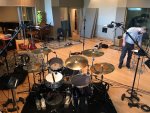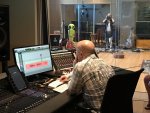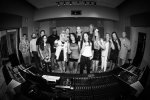"Laptops, i.e.m.,click, triggers, samples pads, recording equipment" - that's a lot of stuff. Start with one thing and see if you can do something useful with that. It takes years to learn so much and the process never ends, because technology is changing.
Correct, and many drummers aren't directly involved in some of those things around them. For example, recording equipment. I do just about everything when programming a song: create samples, create the sequence, apply
some production value, and make stems that are studio-ready. But, I'm not set-up to record
live drums. For me, that's something that occurs in a studio with perhaps special acoustics, a supply of mics, a capable ProTools system, and an engineer who knows what they're doing. I know how to
mic drums, but only because I've seen it done hundreds of times.
Triggers may not be implemented by the drummer, and the sound module may not even be within their control. Same for clicks - not every drummer starts & stops clicks & tracks. I
used to do that and was in complete control of it, until it was all integrated into our video system. That change was fine with me, the less I have to worry about up there, the better! We have a dedicated video op who's as much a part of the show as the musicians, and I only have to think about playing drums!
A sample pad is a bit of a different thing though, that's still normally the drummer's domain. I started using custom samples in 1985 on a Simmons SDS1 pad. It was hopelessly inadequate, but the only somewhat affordable solution for playing custom samples. Today's pads are fairly easy to operate, they're powerful, and relatively inexpensive.
Bermuda









